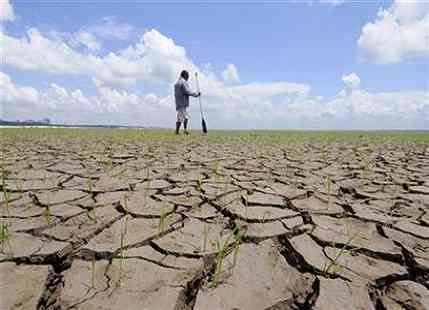In a bid to fit climate change into all of its development drive, Botswana has launched a nationwide invitation for civil society to submit proposals for accreditation to the UN Climate Change Adaptation Fund.
The Adaptation Fund is a financial instrument under the United Nations Framework Convention on Climate Change (UNFCCC) and its Kyoto Protocol (KP).
According to the United Nations Development Programme (UNDP), Climate change in Botswana is already being attributed to a number of changes in Botswana, including longer drought episodes, changes in rainfall patterns, outbreaks of crop diseases that affect the most important sector to rural households and subsistence agriculture.
At a national level, Botswana is experiencing significant water shortages, resulting in dependence on its neighbouring countries for inter-basin water transfers to augments its domestic supply.
Botswana deputy permanent secretary in the Ministry of Agricultural Development and Food Security, Thabang Botshoma explained that the Adaptation Fund has been established to finance concrete adaptation projects and programmes in developing country parties to the KP, in a bid to reduce the adverse effects of climate change.
The Fund is capitalized with a share of proceeds from the Kyoto Protocol’s Clean Development Mechanism (CDM) project activities as well as through voluntary pledges of donor governments.
According to Botshoma, developing countries eligible to benefit from the fund can only access funds through National Implementation Entities (NIEs) accredited to the fund.
“This call therefore seeks to fulfil this imperative to ensure Botswana benefits,” he said.
Entities seeking accreditation with the fund will be nominated and selected on the basis of their adherence to the accreditation requirements that include how the organization meets the specific required capabilities and Fund’s fiduciary and management standards as set by the adaptation fund which includes:
Botshoma explained that an NIE should be a financing entity of good repute; capable, and with a history of comfortably handling large funds.
It should be approved by the GCF panel of adjudicators for accreditation.
“Those willing to apply for accreditation need to be familiar with the NIE self-assessment criterion which include but is not limited to GCF Basic Fiduciary principles and standards, GCF specialized fiduciary principles, GCF Environmental and Social Safeguards as well as Record and Policy alignment,” he said.
Botshoma said drought was taking over and that rainfall was scarce, adding that greenhouse gas emissions were now at their highest levels.
He attributed the harsh effect of climate to import cars in Botswana saying they were mostly to blame for the effects of greenhouse gases because of their high numbers.
It has since emerged that Forest Conservation Botswana (FCB), a non- profit making company mandated to manage the Tropical Forest Conservation Fund (TFCF) in Botswana, has applied for accreditation as Botswana’s National Implementing Entity (NIE), through which the funds from the Green Climate Fund (GCF) will be routed.
FCB Chief Executive Officer, Joshua Moloi said “It is a well known fact that lack of access to climate finance affects environmental funds in Africa and one of the main objectives of CAFÉ is to catalyze support for the environmental funds to access resources from financial partners, part of which could be done through collaborations by partner countries.”
KO/as/APA


